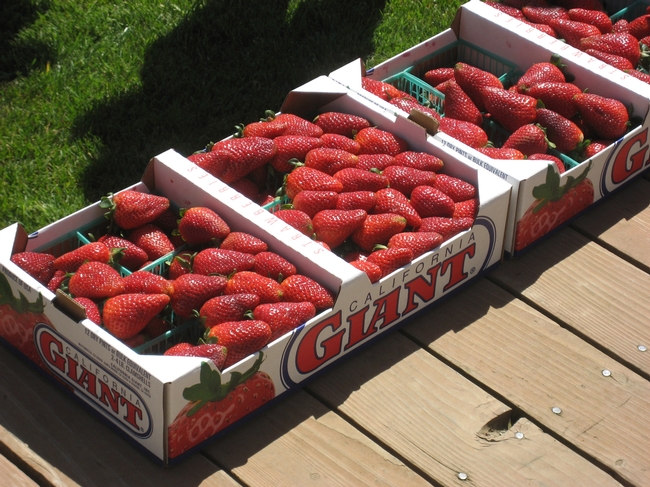
Posts Tagged: Santa Maria
Planting the seeds for garden-based education

Each school day, teachers must carefully plan and account for their instructional minutes. For each grade level has specific time recommendations for math and English language arts, so teachers often feel they do not have the time to include extra activities in their already packed schedules. When UC CalFresh gave a brief survey to teachers a Santa Maria school last year, teachers identified the following barriers to using their school garden for instruction:
- Lack of instructional time or preparation time
- Lack of curriculum and learning activities
- Too many students to manage in the outdoor setting
These concerns reflected comments that UC CalFresh nutrition educators frequently heard from teachers who were invited to bring their students to the school garden.
Taking these concerns into consideration, UC CalFresh developed innovative strategies to meet the needs of school teachers, showing how instructional minutes in the garden don't have to be “extra” and can include hands-on learning for English language arts and math, with a focus on nutrition. The strategies include:
- Clearly aligning garden-based nutrition education with common core lessons
- Providing garden-based curriculum and materials for learning activities in the garden
- Hosting Garden Open House Days, during which teachers can bring their students to the garden when UC CalFresh Educators are present to increase educator-to-student ratios.

The first No-Prep Garden-Based Nutrition Education Kit was piloted in October and featured pumpkins. The No-Prep Kit became fondly known as the Pumpkin Kit. The Pumpkin Kit encouraged teachers to take the lesson out to the garden, increasing students' physical activity time while providing opportunities for students to practice common core skills. The kit focuses on nutrition and cooking while reinforcing math, science and language arts. The kit includes books, worksheets, an oven, and several different pumpkins for measuring, cooking, estimating, and tasting. This kit requires no teacher prep time, is adaptable to any primary grade level, and is an easy introduction to garden-based lesson delivery.
During a Garden Open House Day hosted by UC CalFresh in October, kindergarten students and their fifth-grade buddies came out to the garden. The fifth-grade buddies worked with the kindergarten students to use observation skills (five senses), learn adjectives, and draw the pumpkin life cycle. The older buddies gained teaching and language arts skills while working with their little buddies in the garden. Students got to dissect the pumpkins in teams and used the seeds for counting. Each kindergartener took 20 seeds home to practice counting with their parents, which also served as a budding connection for students' families and the school garden.
"If we had something like this every month, we would be able to go out into the garden more and maybe we could get more teachers to come. This is what we need, curriculum that can be used in the garden," said kindergarten teacher Mrs. Joaquin.

“The program has been awesome," said one fourth-grade teacher. "[UC CalFresh] incorporated math, science, social studies into lessons. Students were excited and engaged. Many tried new vegetables they'd never had before and liked them! Kids learned responsibility and pride in designing, choosing plants, maintaining and harvesting in school garden.”
For more on UC CalFresh of San Luis Obispo and Santa Barbara counties see the Facebook page at facebook.com/uccalfreshslosb
UC CalFresh nutrition education is offered in schools jointly by UC Agriculture and Natural Resources and USDA.
UC estimates costs for growing strawberries on coast

Each analysis is based upon hypothetical farm operations using practices common in the region. Input and reviews were provided by UC Cooperative Extension farm advisors, UC researchers, growers, farm accountants, pest control advisers, consultants and other agricultural associates.
The studies describe the assumptions used to identify current costs for the individual crops, material inputs, cash and non-cash overhead. A ranging analysis table shows profits over a range of prices and yields. Other tables show the monthly cash costs, the costs and returns per acre, hourly equipment costs, and the whole farm annual equipment, investment, and business overhead costs.
The new studies are as follows:
Sample Costs to Produce Strawberries, 2011, South Coast Region (Santa Maria Valley) by Surendra Dara, Karen M. Klonsky and Richard L. De Moura.
Sample Costs to Produce Strawberries, 2011, South Coast Region (Oxnard Plain) by Oleg Daugovish, Karen M. Klonsky and Richard L. De Moura.
Sample Costs to Produce Second Year Strawberries, 2011, Central Coast Region (Santa Cruz & Monterey Counties) by Mark P. Bolda, Laura Tourte, Karen M. Klonsky and Richard L. De Moura.
All cost of production studies are available for free download at http://coststudies.ucdavis.edu, at UC Cooperative Extension offices or by calling (530) 752-3589. For more information about the studies, contact Richard De Moura at rdemoura@ucdavis.edu in the Department of Agricultural and Resource Economics at UC Davis.
